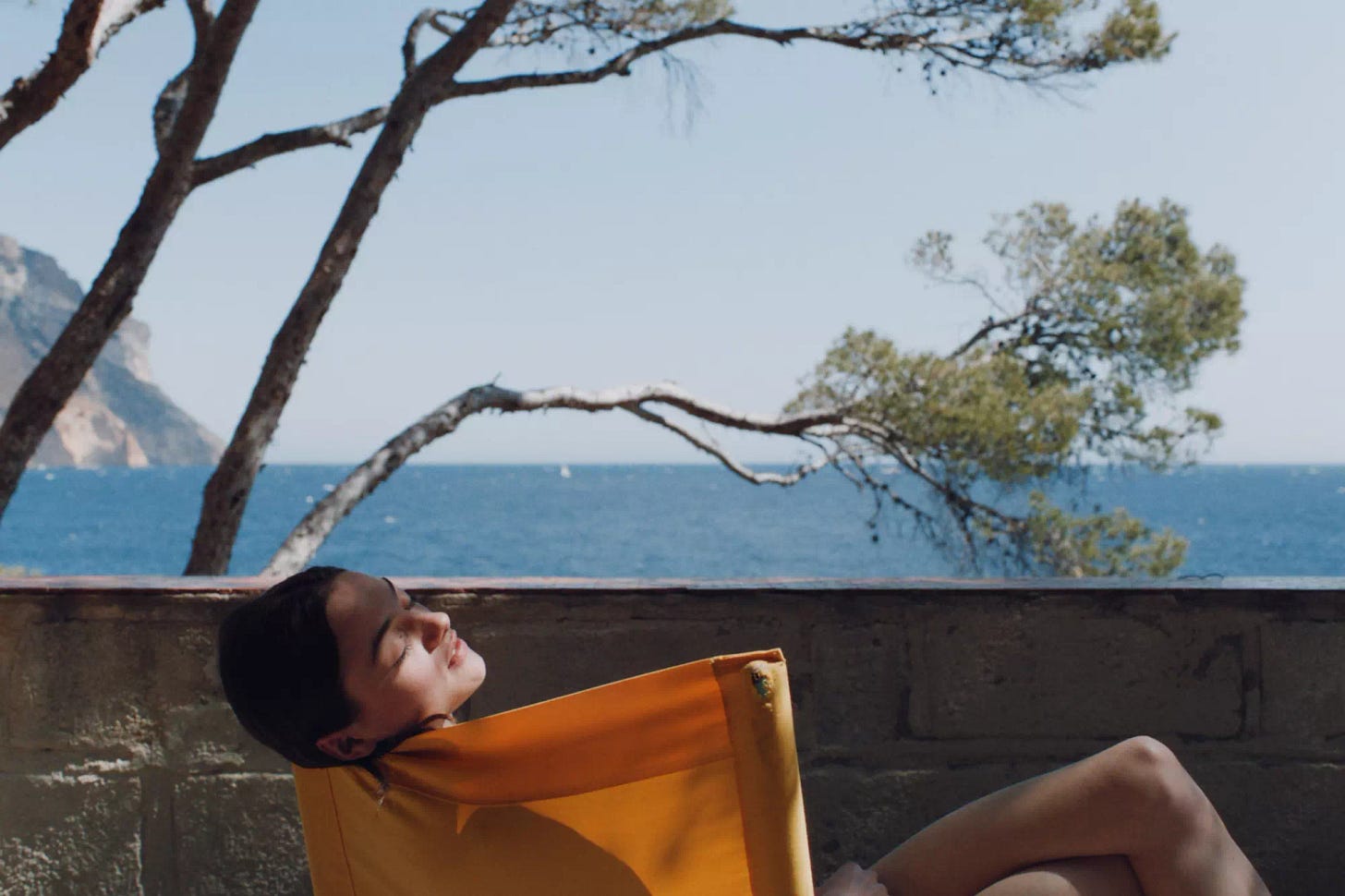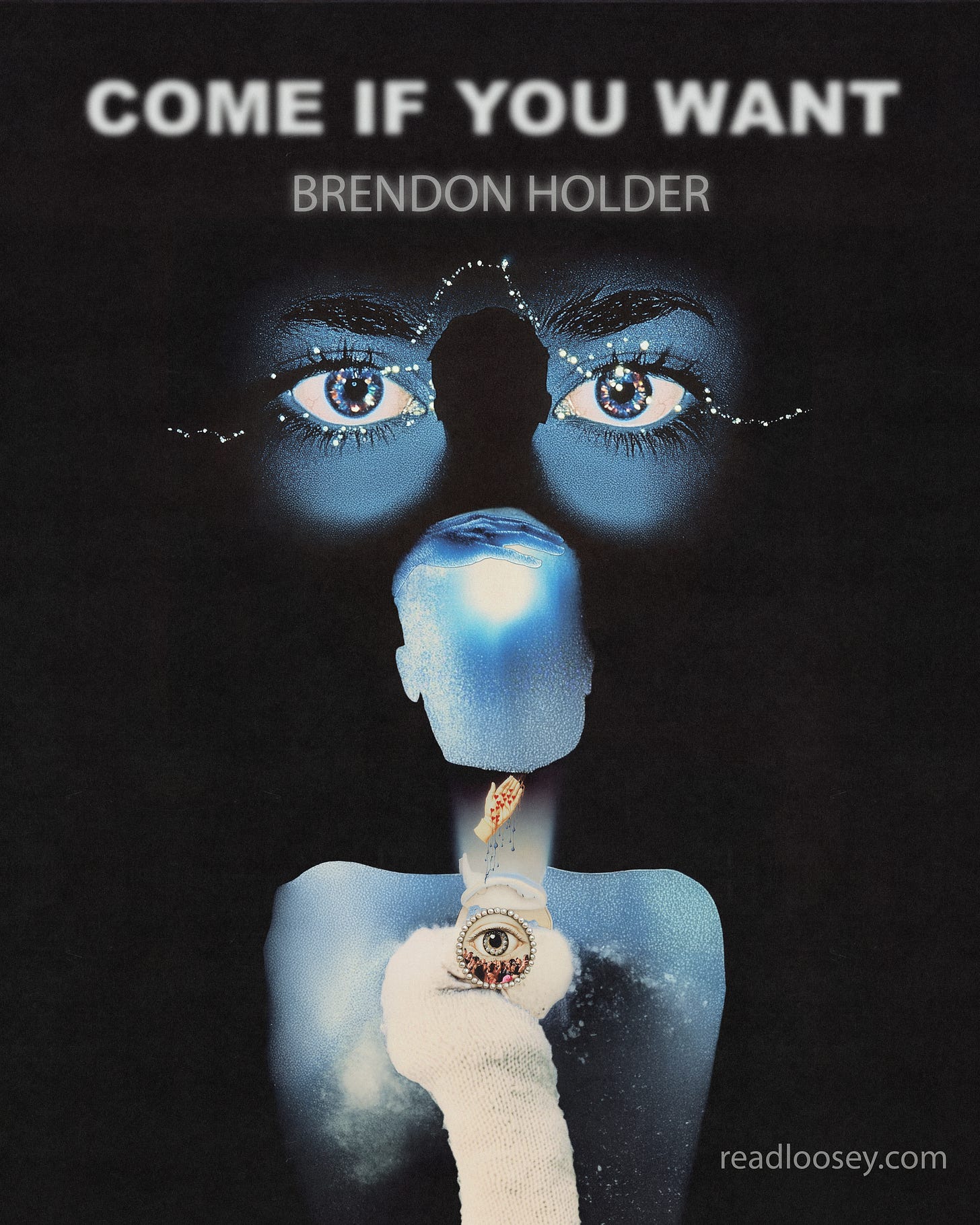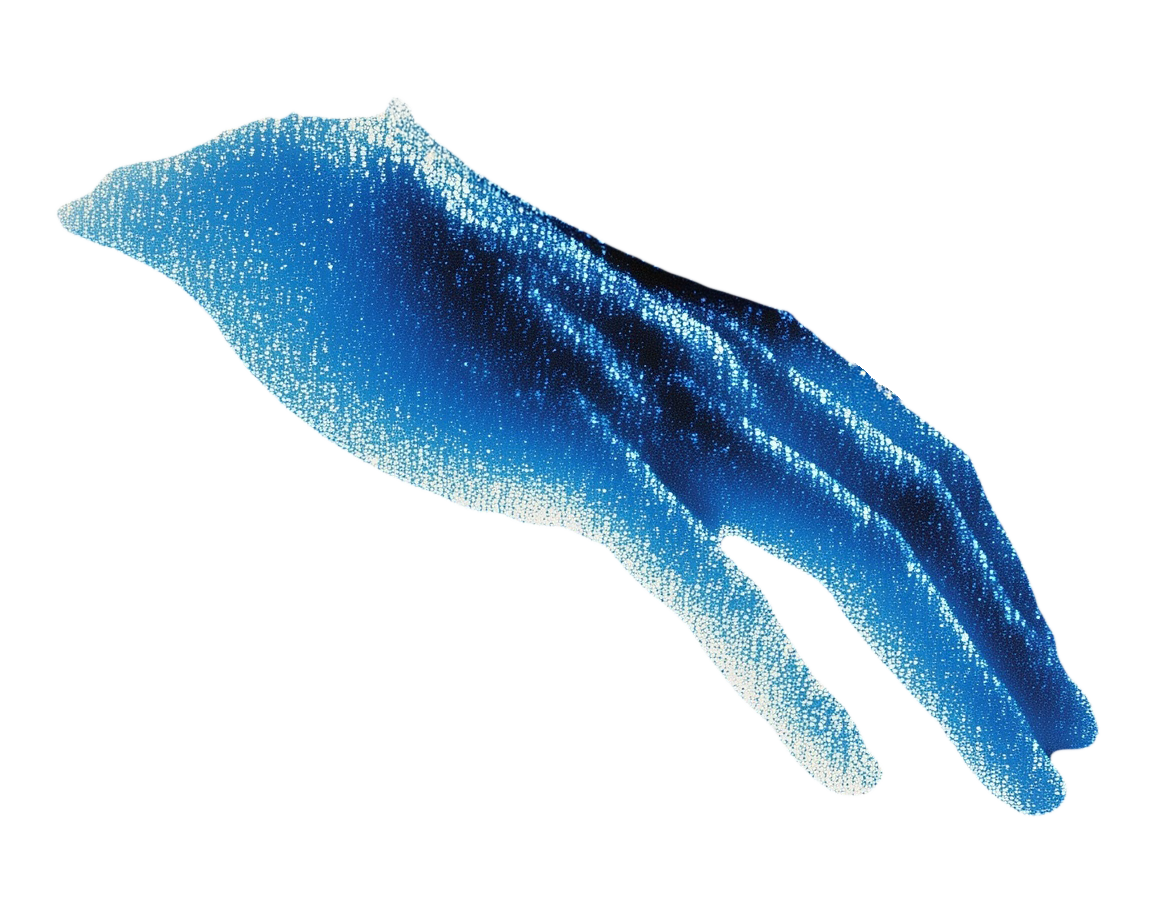Would you be happier if you were a bit more stupid?
modern romance with love island, the materialists, and bonjour tristesse
The first chapter of my serialized novella, ‘Come If You Want’ will be sent to subscribers on Tuesday, July 8th. Learn more here.
There is a line of dialogue in Bonjour Tristesse that burrowed into me the moment I heard it in the theatre. The film is the second adaptation of a novel of the same name, originally published by a French eighteen-year-old named Françoise Sagan in 1954. Newly refurbished by first-time film director Durga Chew-Bose, the narrative surrounds the shifting dynamic of a Parisian quartet — a conflicted 17-year-old named Cécile, her playboy father Raymond, his bohemian girlfriend Elsa, and Anne, the stoic and fashionable best friend to Raymond’s late wife and cool-aunt-figure to Cécile. The four of them have retreated to the south of France in the summertime, as one does.
That day, there was a flash storm in New York, droplets assailing me as I emerged from the G train and so, in the theatre, snacking on pigs-in-a-blanket, I allowed myself to be transported to the French Riviera for a couple of hours. Chew-Bose moves us along with leisure, mirroring the ease and lethargy of a vacation. We sip from languid scenes of rocky beaches, sun-bleached cobblestones, and air-dried bathers, meticulously styled by Miyako Bellizzi. The film’s lens latches on closely to Cécile’s perspective, but, at times, migrates to the closed conversations of the adults, the quiet bargains and contemplations of old friends as they hush over what’s left to salvage of a relationship weathered by time. As Anne and Raymond tilt themselves toward the last few decades of their life, the possibility of a romance between them splits open, an opportunity that they wouldn’t have considered during the years closer to Cécile’s mother’s passing. As time moves on, the invisible logic we construct in our heads erodes, leaving space for emotion to steer us. And there, enclosed within a tiled kitchen, in a quiet conversation between Raymond and Anne, is where I hear the line:
“Be wrong sometimes. It’s less lonely.”
Raymond is not even saying this persuasively; it’s with humour, actually, his words breaking free from a grin. In this instance, he’s not even referring to the two of them romantically; they are talking about something else: Cécile’s summer fling with a neighbouring boy that Anne doesn’t approve of. Yet, the dialogue stuck with me, terse but sweet like dark toffee, oozing from the lips of Raymond, brought to life by actor Claes Bang. The recipient is Anne, whose untouchable glamour is expertly conjured by (who else?) Chloë Sevigny. She appears to be entertained by the quip, letting the advice roll around in her head to eventually toss it away. Still, you can tell something has changed in the air for her. For them. Her icy, righteous exterior is thawed from being seen so squarely by Raymond, her old friend, laying the groundwork for the central conflict of the film — a tension Cécile is set to resolve one way or another.
The idea of abandoning reason — or Anne’s case, ‘being wrong,’ — to be happy, is a bargain I have thought of a lot. In the past, I have considered the dichotomy of “Would you rather be happy or be right?” when deciding whether or not to crash out about something, when choosing whether a battle is worth fighting. It’s obviously a made-up binary, but the short form is effective and emblematic of a lot of decisions we face: at what point do you betray your smarts for the sake of being happy? Or, to put it more bluntly, would you be happier if you were a bit more stupid?
I like being right. I am single. I don’t think there is a correlation between the two, but there is a quiet thought that if I weren’t so discerning, my romantic life may look slightly different. Not better, but different.
But the number of models for modern romance suggests that mechanized discernment and strategy are the primary ways to obtain a relationship. Every day, there is a new dating app. People are consulting ChatGPT to help them respond to texts from those they are interested in. TikTok is stacked with terrible dating advice. Heck, people are scheduling themselves in run clubs to find someone. Today, love has become labour, something to overthink and strategize with a game plan. But can you smart your way into a relationship without killing the vibe? And is this making us any happier?
This tension takes center stage in the film The Materialists, the latest love triangle from Celine Song. In the movie, we watch Dakota Johnson as Lucy, a calculated matchmaker who appraises New York’s elite to assign them on dates based on her studied methodology of romantic potential. Her strict romantic logic comes into question when she finds herself juggling two men locked in pursuit of her affection: a struggling (read: broke) actor whom she’s dated before, played by Chris Evans, and a very rich and attentive banker played by Pedro Pascal. I don’t remember any of the men’s names in the movie and don’t care to look them up.
Okay, so I know people have a lot of thoughts about this movie — that the movie is ‘broke boy propaganda,’ that it’s a horror story Trojan-horsed as a romcom, that it’s not really a ‘love triangle’ because there is no chemistry between any of the leads. I’m not going to debate or regurgitate any of these takes here. I found the movie to be entertaining. For better or worse, I responded to the film’s themes rather than its execution, the idea that when it comes to love, we are constantly evaluating partners with a mix of head and heart. The material and the immaterial. Even once in a relationship. The most effective scenes in the film, to me, are the vignettes in which Lucy is fed a laundry list of non-negotiables from her clients on what they want in a partner, lengthy and specific checklists of material attributes that make sense on paper but do not signal romantic compatibility. ‘Standards’ is what Anne would call them; ‘unrealistic expectations’ is how Raymond would correct her.
In the end, The Materialists wants us to favour the intangible, as Lucy – spoiler! – ends up with the actor, despite being geared towards reason and claiming that her non-negotiable is a rich partner. The film wants us to believe that Lucy would rather be irrational but happy with Chris Evans than enter a partnership based on mutual respect and access to riches with Pedro Pascal (who I kinda thought she had more sparks with, but… whatever). The Materialists emphasizes this somewhat biblical thesis (material standards = bad) with its treatment of supporting characters; every woman who enters into a relationship while adhering to her romantic standards is punished for it, some miserable on their wedding day, while others are sexually assaulted.
Now, I don’t know if Chris Evans’s character was the ‘intangible, happy choice’ based on what we saw, but, on a broader level, I understand what Celine Song’s lens is set on. When contrasted with her previous film, Past Lives, it does seem like she’s working towards a grander narrative that wrestles between the rational, safe choice, and the intangible promise of a relationship that reaches an emotional actualization for both partners. If I am to examine both of her projects on their intentions, the two conclusions split into opposite halves of each other. In Past Lives, Nora picks the rational choice and stays in her American marriage while Lucy chooses what we are to believe is the emotional choice. But, at its core, I don’t know if either of them is better for it. In both films, I found myself wishing that the leading women made the opposite choice, that Nora picked her Korean childhood sweetheart and that Lucy shacked up with the rich Pedro Pascal. Despite enjoying both films immensely, I felt like both women betrayed themselves in the end. If I were to imagine how it would play out for both couples in the long run, I don’t think either of them makes it. But maybe, that’s the pearl of Celine Song’s genius; a trickster’s couplet when you view both films in tandem. People betray themselves in the pursuit of love. Maybe there will never be a perfect choice. Or, maybe, what she’s hinting is that both women would be better off single.
And who hasn’t felt this way? How many of us have watched friends enter and sustain relationships with someone who ‘checks the boxes’ with little chemistry or things in common, left counting down the days until the break-up or, worse, the divorce? How many times have we become entangled with someone who makes no sense for our long-term romantic objectives but… might be satisfactory for our short-term needs? I guess I’ve been stupid before. Happily stupid. And sometimes stupid is the best you can be in a world of rising finances and rent, ticking body clocks, wounded hearts unwilling to test the market again, and friendship, enduring friendships that can feel more nourishing and intimate than romantic relationships. But, at some point, fact wins over the fiction of the heart, trululu surmounts delulu, and we emerge from the tryst with clearer eyes, blinking ourselves to sobriety. Just what was that?
To help us answer this vicariously, I’m glad we have Love Island USA. I missed the boat on the last season, which was incredibly popular, but caught the gist from the Leah and Rob fancams on TikTok and X/Twitter. When this season came around, I was told to lock in immediately or I’d miss out again, and, boy, I am so happy I did.
I don’t even think understanding the mechanics of Love Island is critical to enjoying it, but I’ll do my best: attractive singles are placed on an island with the hopes of finding a connection and being the final / favourite couple that America votes to win $100,000. Somewhere wedged between the rudimentary conversations and migrating lip filler are the contemporary ponderings of real people weighing the material and the intangible. The decision between the physical chemistry of one option and the emotional depth of another. But the real relationship they are trying to win over is the one with America. Beyond the chance of winning $100,000 and finding the love of your life, what Love Island offers is a fast track to a certain type of stardom, a lucrative influencer career loaded with brand deals from the likes of Raising Cane’s Chicken Fingers, and Fashion Nova. As the contestants assess romantic compatibility with the same material vs. immaterial frameworks that we do in reality, a third axis has emerged that complicates their decisions even more — the gaze and voting power of the audience. As such, it’s been entertaining to attempt to discern what is real from the passionate make-outs and mascara tears to what is cosplay and campaign within the crash outs.
Love Island pushes for clarity when asked the central question of ‘Would you be happier if you were a bit more stupid?’, urging the cast to define what ‘happiness’ means for them. If ‘happy’ for a Love Island contestant means finding a genuine connection, regardless of what America thinks, they should pursue who they want without additional consideration. In other words, be stupid and go forth towards love without reason and smarts. If ‘happy’ for a Love Island contestant means winning the money, then every decision from how they present themselves in the confessionals to who they ‘couple up’ with, must be done with calculation and strategy. This season, it appears that most of the cast has chosen the latter. There are fewer couples than ever and the ones that exist lack any sort of authentic chemistry: Taylor never liked Olandria and eventually ditches her for Clarke; Nic and Cierra appear to be in an arranged partnership, their only commitment being to remain uncommitted once they leave the show; Ace and Chelly want to appear ‘open to exploring new connections’ but suddenly signal affection once they learn that America thinks they are fake. When forced to vote each other out, the cast consistently separates couples with genuine connections (Hannah from Pepe, TJ from Iris), silently revealing an agenda to oust any couple they deem as threats to becoming America’s favourite. In the end, it’s clear that none of them like each other. Instead, they are manufacturing relationships to present back to us like a pageant, a falsity that most of its viewers, or any student of reality television, can clock. I think back to Raymond in Bonjour Tristesse, “Be wrong sometimes. It’s less lonely.” In this case, the ‘right’ choice that brings them closer to the $100,000, ironically, will only make them lonely in the end, devoid of real connection but also disliked by America. Despite Raymond’s advice to be wrong, this was one thing he was right about.
The throughline of these contemporary expressions tells us to be wary of our own reason, as it may pull us farther away from what fulfills us. The overthinking and calculation do much to protect us, but, in the end, might lock us in a prison of our own logic. And yet, I cannot simply just abandon critical thought. Yes, it’s fun to live in a temporary fantasy, but at some point, I believe some governance and certain standards are needed. But even if you know what conditions will make you happy, you can’t gamify your way into happiness. So yes, be stupid. Be happily stupid, even. If you’re having an affair in the French Riviera, on a reality dating show set in Fiji, or riding the G train. Be stupid, even if it’s just for the summer.
Thanks for reading LOOSEY. My serialized novella, ‘Come If You Want,’ kicks off this week with a new chapter dropping every Tuesday for the month. I will be discussing with readers and special guests in the comments and the Subscriber Chat, so download the Substack App to participate. If you like what I do, consider sharing with a friend (or group chat) or upgrading to paid.
LOOSEY is a biweekly newsletter about culture, art, technology, and the way we live. If this is something you like, consider subscribing and sharing. Let’s be friends on Instagram.










Great essay on two of my favorite films of the year. I think the best of art helps us to investigate ourselves, and your essay definitely helped to open up a further internal conversation on these works.
And for the record, I don’t think there is any way to truly be in love without being willing to give up some level of control or “rightness?”
“You can’t gamify your way into happiness” - I keep seeing this repeated in different lenses. I just read a piece about the “gigification” of relationships reflected in popular media. It feels like a response to curation and keeping up appearances in an increasingly isolating world. Really interesting analysis.